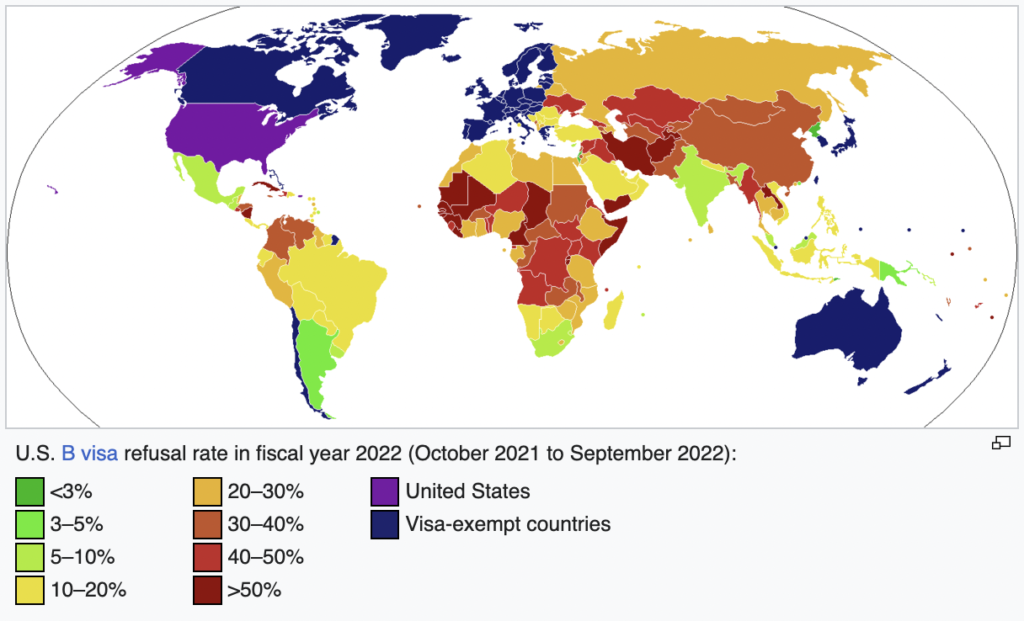Palestinian Americans Hold Up Israel’s Admission to the US Visa Waiver Program

By: Bishara A Bahbah / Arab America Featured Columnist
Palestinian Americans are holding up Israel’s admission to the U.S. Visa Waiver Program (VWP). They want Israel to meet all outstanding requirements for admission outlined in the U.S. federally-mandated statutory.
Some had hoped that the one-month trial period would begin on July 1st. However, it appears unlikely that the U.S., Israel, and Palestinian-American sides would resolve all outstanding issues by that self-imposed deadline. The negotiations’ participants informed me that Israel would ultimately be admitted before the September 30th deadline. The sooner Israel acquiesces to U.S. and Palestinian-American demands, the sooner Israel will be admitted to the program.
Both sides have lined up their congressional supporters to lobby the Joe Biden administration. The pro-Israel side wants to make Israel’s admission into the VWP a top priority for the U.S. State Department and the Department of Homeland Security. While the other side, made up of mostly the progressives in Congress and lawmakers with heavy Arab-American constituencies, demands that the United States follow the requirements of admission in the statute.
According to a published study by the Congressional Research Service, to qualify for the VWP:
* A country must offer “reciprocal travel privileges” to U.S. citizens;
* Have had a nonimmigrant visa refusal rate of less than 3% for the previous year;
* Issue electronic, machine-readable passports that contain a biometric identifier, for example, e-passports with a data chip containing biometric information such as fingerprint and digital photograph;
* Issue tamper-resistant, machine-readable visa documents that contain biometric identifiers which are verifiable at the country’s port of entry;
* Report the loss and theft of passports within 24 hours;
*Share specified information regarding nationals of the country who represent a threat to U.S. security and certify that the participating country is screening each foreign citizen who is admitted to or departs from that country, using relevant INTERPOL databases and notices; and
* Accept the repatriation of any citizen, former citizen, or national against whom a final order of removal from the United States is issued within three weeks after the order is issued.
Countries are terminated from the VWP if they fail to meet these conditions or threaten the United States’ security or immigration interests. There is a precedent for removing a country from the VWP. Argentina was booted from the program when visitors from that country overstayed their 90-day visits to the United States due to a severe economic downturn in the home country.
Palestinian Americans have been relentlessly lobbying the Biden administration, primarily through the U.S. Department of State and the Department of Homeland Security, which oversees the VWP, to ensure the equal treatment of Palestinian Americans under the program. Palestinian Americans recognize that they cannot ultimately stop Israel from being admitted. However, they can push as hard as the statute that governs the VWP would allow them.
Palestinian Americans have legitimate concerns, chief among them:
1. The demand for full reciprocity for American citizens traveling to and from Israel and the Occupied Palestinian Territories (OPT). As U.S. Ambassador to Israel, Tom Nides has repeatedly stated, “Blue is blue.” The United States expects its citizens to be treated equally by participating nations.
Nides has been quoted as saying that if you have a blue U.S. passport, “you can travel just like any Israeli who travels to the United States.” Nides added that if you are an “Arab-American citizen living in Michigan and you also happen to have been born in the West Bank — yes, under this process [VWP], you could get on an airplane, fly to Ben Gurion airport and drive to the West Bank.” He added, “If you are an American citizen [with] a blue [American] passport, live in the West Bank, and want to go to the U.S., yes, you could go through the same security and screening process as everyone else. Blue is blue.”
2. All Americans, including Palestinian Americans, must have full access to Israel and the OPT, without exception.
3. U.S. citizenship must be considered the primary citizenship of Palestinian Americans, irrespective of any other citizenship they might hold. Thus, when dealing with Palestinian Americans visiting or residing in the OPT and who possess a Palestinian identity card, Israel must treat Palestinian Americans as Americans first. In this case, one can argue that the legal weight of a U.S. passport is more significant than that of a Palestinian I.D. which can only be issued with Israel’s approval and is, effectively, a travel document.
4. Criticism of Israel cannot be viewed as antisemitism. It is protected free speech under the U.S. Constitution. Conversely, attacking Jews because they are Jews is a heinous crime. However, Israel cannot prevent Americans of Palestinian descent from entering Israel or the OPT because they are critical of Israeli policies toward the OPT and its inhabitants. Sadly, the events of the last few weeks are a reminder that Israel’s military is not willing to intervene to protect Palestinian civilians from Israeli settler violence. At times, troops participated in the riots and vandalism against unarmed Palestinian civilians. Those rampant attacks on Palestinians have increased in frequency and brutality since Israel’s far-right government assumed the country’s leadership. Only in recent days did the Israeli security and political establishments consider those setter attacks against innocent Palestinian civilians “national terrorism.”
The United States must not cave in to accommodate Israel in any way that violates U.S. statutes. Israel has a unique status among nations. It has refused to define its boundaries and is the only country in modern history that has maintained its occupation of Palestinian lands for more than five decades. No government has recognized Israel’s occupation of Palestinian lands following the 1967 war.
Today, the Visa Waiver Program, established in 1986 as a trial program and made permanent in 2000, allows nationals from 40 countries to enter the United States as temporary visitors for business or pleasure without obtaining a visa from a U.S. consulate. Typically, visitors to the United States have to apply for a visa at a U.S. consulate. This process is arduous and time-consuming because the waiting period between the application and the face-to-face interview with a U.S. consular officer could be several months. More importantly, consular officers can decline a visa request for any reason they deem valid.
What is Holding up the Final Agreement?
According to sources close to the negotiations, a draft agreement between Israel and the United States regarding the VWP exists. However, the draft agreement has yet to be finalized, pending the resolution of several thorny issues raised by Palestinian Americans.
Israel insists that Palestinian Americans who reside in the OPT or who hold Palestinian identity cards would have to submit an online application to Israel’s Civil Administration, otherwise known as the Coordinator of Government Activities in the Territories (COGAT), to request a permit to travel to Israel or to fly out of Ben-Gurion Airport. Such a discriminatory system is already in place, and the only way for Palestinian Americans to avoid it is to travel from the West Bank to Jordan via one of the two bridges that connect Jordan to the OPT. Suppose Palestinian Americans are forced to apply for a travel permit through COGAT; in that case, Palestinian Americans consider such approval tantamount to the U.S. ceding the rights of American citizens to an occupying power.
If the United States approves this discriminatory permit system, it will institutionalize an unfair and illegal practice against Palestinians who are U.S. citizens. According to Zaha Hassan, one of the lawyers involved in the negotiations with the Biden administration, this would be a “gift” to Israel, and “blue” would be a tainted “blue” when it comes to Palestinian Americans.
Another thorny issue in the negotiations between Israel and the United States is the status of American citizens living in Gaza. According to Dr. Hanna Hanania, a Palestinian American involved in the talks, Israel has insisted that Gaza is off-limits and cannot be part of the ongoing negotiations. If Palestinian Americans wish to travel to Gaza, whether they travel through Ben Gurion Airport or the bridges, any entry into Gaza would be subject to the existing regulations of Israel’s military regime that has total control over who enters or leaves Gaza from the Israeli side. This issue remains a contention and awaits negotiations between Israel and the United States.
Based on the “center of life” principle, if Palestinian Americans do not possess a Palestinian ID, they would presumably be treated like other Americans with no permits required to travel through Ben Gurion Airport or visit any part of the West Bank and Israel, but not Gaza.
Given the charged situation in the West Bank following the nightly attacks by Israeli settlers, in collusion with an unidentified number of soldiers, on Palestinian civilians, it is unlikely that the U.S. government would announce Israel’s admission to the VWP anytime soon. U.S. officials are perturbed over the Israeli government’s lack of interest in capturing the vigilante settlers in the West Bank, let alone bringing them to justice. U.S. officials are infuriated over Israel’s continued settlement expansion in defiance of the rule of law and U.S. foreign policy. The announcement of Israel’s admission into the VWP under the present charged situation in the West Bank would undoubtedly engender a severe backlash from Arab countries and even many European countries.
To reach a final agreement about Israel’s admission into the VWP, Israel has to offer additional concessions. Furthermore, Israel’s acceptance into the VWP does not mean that any Israeli can decide on the spur of the moment to hop on a plane heading to the United States. The United States requires that members of the VWP must get approval from the Electronic System for Travel Authorization (ESTA). This web-based system checks the traveler’s information against relevant law enforcement and security databases before they board a plane to the United States.
The coming two weeks are crucial in shaping the agreement between the U.S. and Israel over the latter’s admission into the U.S. VWP. Should Palestinian Americans not be satisfied with the outcome of those negotiations, the option of taking the matter to U.S. courts exists. It would be on the applicability of “blue is blue” to Palestinian Americans.
About the Author: Dr. Bishara A Bahbah is the president of “Voices for Palestine,” whose primary objective is to make experts available to the media and events related to Palestine. He is the former editor-in-chief of the Jerusalem-based Al-Fajr Newspaper. He taught at Harvard University and was the Middle East Institute associate director at Harvard’s Kennedy School of Government.
The views and opinions expressed in this article are those of the author and do not necessarily reflect the position of Arab America.
The reproduction of this article is permissible with proper credit to Arab America and the author.









